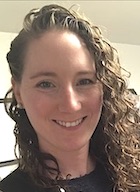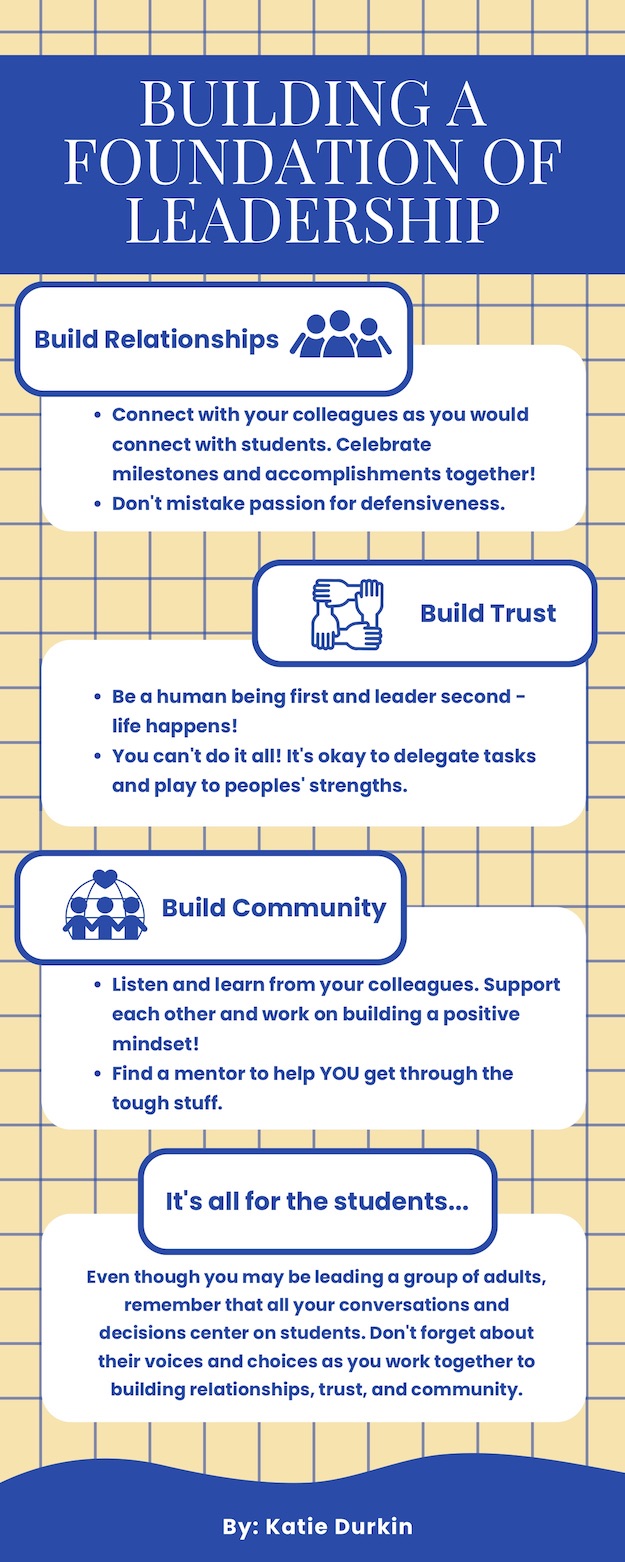3 Things I’ve Learned as a New Teacher Leader
By Katie Durkin
 When my husband and I bought our first home in 2016, we were young, inexperienced, and overwhelmed. The house had great bones, but it was a bit of a fixer upper. Every room needed work, and we had grandiose plans of building an addition. But, by purchasing the home, we were starting our lives together, building a foundation upon which to continue.
When my husband and I bought our first home in 2016, we were young, inexperienced, and overwhelmed. The house had great bones, but it was a bit of a fixer upper. Every room needed work, and we had grandiose plans of building an addition. But, by purchasing the home, we were starting our lives together, building a foundation upon which to continue.
Buying our first home has felt a lot like being a leader for the first time in my school this year. It’s overwhelming, I’ve made mistakes, and I’m still learning. At the same time, leading our team of 7th grade teachers has been incredibly rewarding.
Even though it is still early in the year, I have been reflecting on what I have discovered so far about being a leader. I have worked on building my foundation for effective leadership, and I’ve learned this requires strong relationships, trust, and building a sense of community with a team of teachers.
1. Build Relationships
I have always found that when I connect with my students I am better able to teach them. I am learning that the same goes for our team. I am building relationships with each of them, specifically learning about them on a personal level. This helps me understand what is going on for them outside of school, as well as finding ways to connect with them on a human level.
On our team we take the time to celebrate milestones and birthdays, recognize personal accomplishments, and share the little things that happen in our lives on a daily basis. It’s important to ask how they are doing each day and what they did over the weekend.
I know I have appreciated in years past when leaders know a bit about my life, so I wanted to do the same thing with my colleagues this year, especially with new members of my team that I’ve not worked with in the past.
Building relationships also means there will be hard days as a leader. There are days where I feel like everything is going wrong, especially when I have to relay unpopular or difficult news. This becomes the daunting part of leadership for many of us, and it can sometimes be lonely.
I have noticed that there will be times when my colleagues can be perceived as defensive, but getting to know them as people and educators has revealed that they are passionate about their craft and their students. Knowing this helps me better understand the ways people respond so I can be empathetic to their perspectives.
I don’t believe we should make the mistake of assuming someone is being defensive, and I have worked to find time to have difficult conversations with them to find out what is making the person think or feel a certain way. I have come to learn that often they just want something to be different to help the school and our students.
2. Build Trust
This year I have learned that if I work to build relationships with my team, I will also be building trust. I believe this means that I need to be a human being first and a leader second. I must recognize that everyone is dealing with the difficulties of being a teacher, as well as what is happening for them beyond school.
I believe being a human being first means providing support, understanding, and a measure of grace with each person. Life happens, and if you want to build relationships that are supported by trust, then as a leader, you must humanize your practices, in the same way that I would argue we work with our students.
Building trust also means leveraging the strengths of our colleagues. I have learned very quickly as a leader that I can’t do it all. But I am incredibly lucky to work with individuals who have diverse expertise to bring to the table. By learning about our team members’ strengths, I have been able to leverage the intellectual capital available in our group to overcome challenges. I’ve found that colleagues are more than willing to help, especially when it plays to one of their strengths.
3. Build Community
If being a leader is founded on relationships and trust, then I believe you can foster community through a shared vision and purpose for our work together.
The first thing I have learned about building community is to listen. I know this seems simple, but I believe in order to be an effective leader, I need to recognize that I don’t know everything. By listening to my colleagues, and acting on their opinions or concerns, I am demonstrating that their thoughts matter.
Building community also allows our team to overcome obstacles because there have – and will continue to be – times when we are dealing with ‘tough stuff.’ I have learned that even though we are faced with a multitude of demands as teachers and leaders, we can’t just vent or complain when there are obstacles (even though venting helps!).
It’s important to steer conversations back to solving problems, rather than creating more. Helping my colleagues understand problems, and then brainstorm ways to solve them, has been incredibly helpful this year. I believe it has helped us to keep a positive mindset focused on growth and community.
Here’s another way to look at community. As a leader, I believe I need to belong to multiple communities in order to be effective. This means creating a community outside of a team, specifically through mentorship.
I have found so many people in my building – both new and seasoned leaders – who are willing to help me navigate my new responsibilities. Having someone to problem-solve with has been incredibly valuable this year. As a leader it’s important to know when to ask for help. Find someone, or a group of people, to build relationships, trust, and community with to help you maneuver the trials and tribulations of being a leader.
It’s Always about the Students
The one thing I have been trying to keep in the forefront of my mind this year is this: the work I do as a leader, and the work we do collectively, is all for the students.
Even though I may be leading a group of adults, the work and conversations should be centered on what everyone is doing for the students we have shared responsibility for.
Sometimes I think we can get so bogged down in the minutiae of our daily demands we may forget that working together to make a difference in students’ lives is why we became teachers. As we focus our leadership on building relationships, community, and trust, we need to remember that this work has ripple effects. We can continue to make positive change in the lives of our colleagues while also having an impact on students.
I know that I have so much to learn, but I’m hoping that by building relationships, trust, and community, I will have the foundation I need to continue growing my understanding of what effective leadership looks like in our unique profession.
Katie Durkin (@kmerz610) has been teaching English Language Arts to middle school students for over a decade, and currently teaches 7th grade Reading Workshop at public Middlebrook School in Wilton, Connecticut. She is a zealous reader of middle grade and young adult books and enjoys sharing her love and passion for reading with her students.
In 2022 Katie graduated from Northeastern University with her doctorate in education, where her research examined the impact of classroom libraries on middle school students’ reading engagement. She was the 2020 recipient of the Edwyna Wheadon Postgraduate Training Scholarship from the National Council of Teachers of English. She writes regularly for MiddleWeb.


































